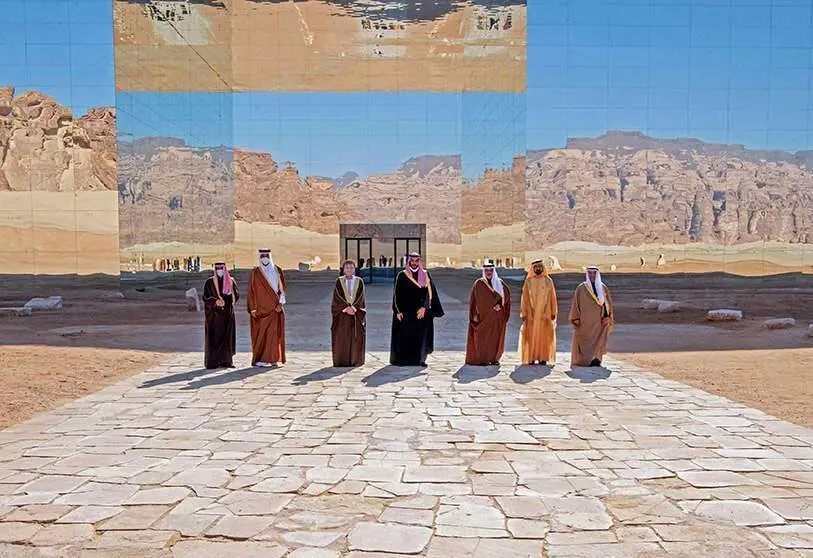End of the crisis with Qatar, following the signing of the "Al-Ula Declaration”

It is official, a new chapter is opening in relations between the Gulf countries. The annual summit of the Gulf Cooperation Council (GCC) has once again brought together Saudi Arabia, the United Arab Emirates (UAE), Bahrain, Kuwait, Oman and Qatar. The great novelty this year was the attendance of the Emir of Qatar, Sheikh Al-Thani, at the summit held in Saudi Arabia, as he had not attended since 2017.
Rumours of the end of the four-year blockade of Qatar were becoming increasingly apparent, particularly following the announcement of the agreement between Saudi Arabia and Qatar to open up their airspace, land and sea borders. This news came just a few hours before the start of the 41st GCC summit.
On arrival at al-Ula airport in Saudi Arabia, the Qatari emir and the Saudi crown prince played a leading role in confirming the high expectations placed on this summit. Both leaders gave each other a warm embrace to stage the reconciliation between their countries.
The summit was chaired by the Saudi Arabian Crown Prince Mohammed bin Salman. In addition to the delegations of the GCC member countries, Saudi Arabia, the United Arab Emirates, Kuwait, Bahrain, Qatar and Oman, this important meeting was attended by Donald Trump's chief adviser, Jared Kushner, and the Egyptian foreign minister, Sameh Soukry.

During the opening address, the Saudi Arabian Crown Prince welcomed the participants and particularly thanked the state of Kuwait for its "efforts to heal the gap, and praised the efforts of Washington and all the parties that have contributed to reconciliation".
In addition, Mohamed bin Salman referred to the threats posed by the Iranian nuclear programme: "Today we have a great need to unite our efforts to move our region forward and to address the challenges around us, especially the threats posed by the Iranian regime's nuclear programme, its ballistic missile programme and its destructive sabotage projects, which he and his representatives adopt from terrorist and sectarian activities aimed at destabilising security and stability in the region, which is facing us".
At the event, Sheikh Nawaf Al Ahmad Al Sabah, the Emir of Kuwait, as the country that has made the greatest effort to put an end to the crisis, did not miss the opportunity to praise all the countries that have made it possible to put an end to the hostilities.
After the Kuwaiti leader's address, the participating members signed what has been termed the "Al-Ula Declaration", putting an end to a crisis that erupted in June 2017 between Qatar, Saudi Arabia, the United Arab Emirates (UAE), Bahrain and Egypt.

The main aim of the "Al-Ula Declaration" is to "enhance unity and cohesion among the countries of the Cooperation Council and to return the joint action in the Gulf to its natural course and maintain security and stability in the region".
Many issues have been addressed during the Council. One of the main points discussed was terrorism and international interference in the region. The GCC expressed its opposition to foreign interference in the internal affairs of Arab countries. It has also expressed the need to stop provocative actions by fuelling conflicts and struggles.
The Council also stressed respect for the principles of sovereignty and non-interference, as well as respect for the privacy of countries based on international rules and laws governing relations between countries.
The Palestinian question was another of the topics discussed during the day. The GCC has once more reaffirmed its support for the permanent sovereignty of the Palestinian people, especially the Palestinian territories occupied since June 1967. They advocate the establishment of an independent Palestinian state with East Jerusalem as its capital and the guarantee of the rights of the refugees, in accordance with the Arab Peace Initiative, with reference to the international decisions.

The need to activate the efforts of the international community to resolve the conflict in a way that fulfils all the legitimate rights of the Palestinian people has been underlined. The Council condemned any act of annexation of settlements in the West Bank to Israel, in clear violation of the UN Charter and the principles of international law and UN resolutions.
The Islamic Republic of Iran, as expected, also took part in the talks of this 41st GCC summit. The Council condemned Iran's occupation of the three islands (Grand Tunb, Lesser Tunb and Abu Musa) claimed by the United Arab Emirates.
The countries attending the summit also expressed their total rejection of continued Iranian interference in the internal affairs of the GCC countries and the region, and condemned all terrorist acts carried out by Iran. The latest news of Iran's decision to enrich uranium to 20 percent was the focus of discussion. The GCC expressed its concern at Iran's continued failure to fulfil its obligations to the International Atomic Energy Agency.
In short, the "Al-Ula Declaration" is a first step by the Gulf countries towards putting an end to hostilities and working towards international cooperation and non-interference. It is not yet known what concessions Qatar has had to make, if any.
Even so, it is too early to say whether these countries will agree on conflicts like Yemen or Libya, where the interests of the different countries are totally opposed. Or what will happen with Qatar's support for the Muslim Brothers, an organisation branded as terrorist by countries like the United Arab Emirates. It is clear that this is a step forward in the relationship between the Gulf countries, but there are still many unknowns to be answered.








